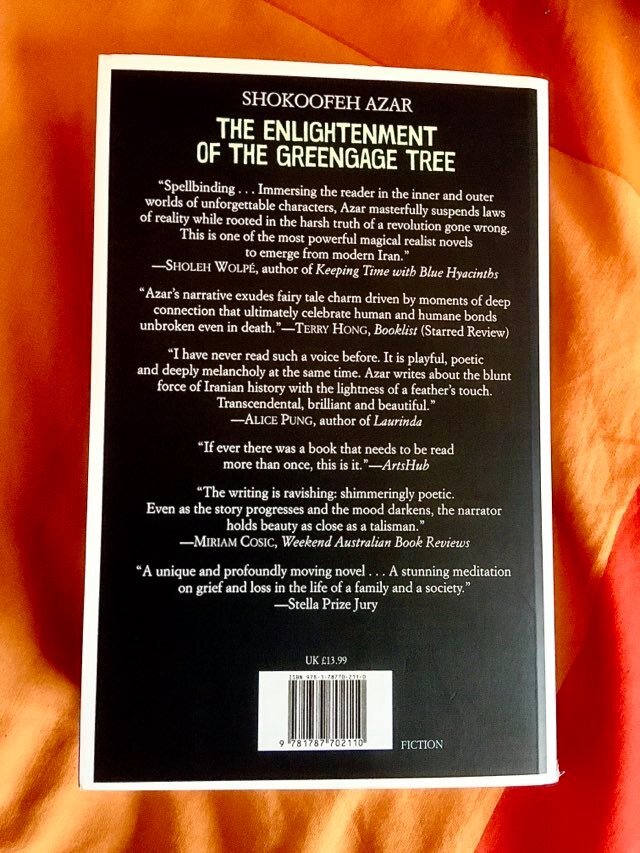Ghosts in the Plum Groves: A review of Shokoofeh Azar’s The Enlightenment of The Greengage Tree
“Beeta says that Mom attained enlightenment at exactly 2:35 P.M on August 18, 1988, atop the grove’s largest greengage plum tree… At that very moment, blindfolded and hands tied behind his back, Sohrab was hanged.”
These are among the opening words of The Enlightenment of The Greengage Tree by Shokoofeh Azar (translated by anonymous). The book unfolds with language, translated from Farsi, that is simply poetic, yet beautiful, weary and violent. It is a triumph, both on the part of the anonymous translator, and the author. I can tell instantly that I will not be able to rest again until I have seen the story through, and It will continue to occupy my mind after the final page has shut. It is difficult to know what to reveal in this review, and what to avoid spoiling for any reader who may go on to enter the book for themselves. I will tread that line of disclosure with care.
As Azar’s opening lines mirror the beautiful moment of enlightenment with a senseless political execution, it is disturbing in the most enticing way. I cannot help but feel that this first page poetically presents the themes intrinsic to the entire narrative; the intense hopes and desires, and brutal realties of change, of revolution and life in Iran. Swimming deeper into Azar’s world, I am shocked by her metaphors, their delicacy somehow landing in my consciousness like intense blows, settling into a dull ache which builds with every passing page. This is a book that hurts. To hold it open and read is like holding the thorny stem of a rose in your palm and raising it to your nose for the fragrance, while the thorns bite ever deeper. The beauty comes with the pain, they are part of the same experience and I begin to feel that this is Azar’s story. It is mystically traumatic, unreal, breaking the laws of narrative and the boundaries between reader and character.
Those who have read One Hundred Years of Solitude by Gabriel García Márquez (to which Azar makes direct allusions in her text) will see the similarities; not only in terms of the books’ shared magical realism, but also in language and narrative style. The books feel the same and are yet distinct, the way that even without consciousness of their colour, a lemon and lime tease your fingers with the same rough dimpling, but can be told apart by the delicate nuances of their skin’s scented oil, left residual on the pads of your fingers.
The book is so rich with cultural, historical and mythological reference that I found myself taking notes and researching, even as I read. What’s more, the heightened sense of unreality, mysticism and the supernatural are so entwined with the lives of the characters that for the duration of my reading, my very perception of life and death and the bonds of nature and spirit are shifted into a truly surreal state. The poetry of language, and links to the supernatural life of the ancient Persian culture are as alive between the pages as I am, sat beside my window reading. In all honesty, it has been sixteen hours now since I finished the book, and I’m not sure I have yet returned from Azar’s world.
One thing in particular stands out for me, upon this brief reflection. The political language of the book is frighteningly bold. Particularly with regards to topics of personal freedom in Iran, I am used to seeing only cautiously reserved discussion. The Enlightenment of The Greengage Tree is like a beam slicing through that murky water. The reflections on religion and community are free of dogma and restriction, the depictions of female sexuality are joyful and daring in the face of Iranian law. Perhaps most inflammatory is Azar’s supernatural account of Ayatollah Khomeini’s psychological and spiritual torture at the hands of the ghosts of his regime’s victims, and the suggestion of a spiritual bond between families and communities that can never be truly dominated by a dictator and his thugs. Azar had to move from Iran to Australia before she was able to write such a text. Its contextual sensitivity is part of the reason for the translator’s continuing anonymity. Under the gaze of the Islamic Republic of Iran, such a dissenting narrative would not be allowed to exist, would not reach publication, and Azar would surely have met repercussions for being the author.
Truly, I would have expected so much more anger from this text, but now I recognise that expectation only stemmed from my own naivety and juvenilely sheltered world view. What I now feel from the book is simply a humbling mix of mysterious joy, longing for a culture that has changed beyond recognition, and final weariness. It is the weariness of decades of revolution, and the realisation that hatred is only wasted. The book is quite simply beautiful. I read it in seven hours, from the first to the last page, but I am not done reading it. This is a book I intend to read again, and I doubt that even then I will have drawn out every mystery from its deeply poetic pages. It has been an astonishing pleasure.
by Jasper Evans


